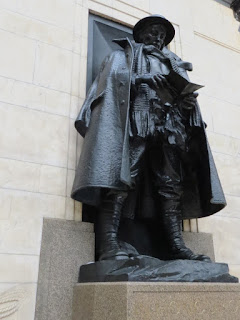Ted and Sylvia extract
https://www.telegraph.co.uk/news/obituaries/5886550/Ted-Hughes.html
In February 1956, at a party to launch the short-lived St
Botolph's Review, of which Hughes was a founding figure, he met a young
American postgraduate from Newnham - Sylvia Plath.
After her first encounter with Hughes, Sylvia Plath
described him in a letter to her mother as "a large, hulking, healthy Adam
. . . with a voice like the thunder of God". Within a few months they
became engaged, and soon afterwards were married. From the beginning it was,
and for some years continued to be, an extremely close, intertwined
relationship. Each gave the other much in the way of literary models,
criticism, stimulus and support.
She was probably more practical, professional and ambitious,
in the sense that her background gave her an instinct for the right moves to
make: clean typescripts, stamped addressed envelopes, and also a notion of
which were the proper journals and covetable prizes. He gave her a deeper,
perhaps quieter, sense of purpose.
It was Sylvia's entry on Ted's behalf of a collection of
typescript poems which, in late 1956, won him a first-publication award for The
Hawk in the Rain. The judges were W H Auden, Marianne Moore and Stephen
Spender. This ensured publication by Faber in London and Harper in New York in
late 1957.
Thus began Hughes's upward literary career, a career only
occasionally deflected. A succession of poems, children's books and plays
followed, and, for a few years, a number of reviews by him in journals, not all
of which have been reprinted.
Hughes was never properly a literary journalist, but there
were times when he was a regular reviewer of children's stories, folklore,
poetry, letters, anthropology and ecology.
His second book of poems, Lupercal, came in 1960. It
contained several of the "animal" poems by which he came best known:
Hawk Roosting, View of a Pig, An Otter, Pike, Thrushes. These began to be
included in anthologies. In the 1960s, Hughes was accepted (in the words of A
Alvarez) as "a poet of the first importance".
But that decade also brought Hughes the break-up of his
marriage to Sylvia Plath and her suicide. These events marked him deeply, and
remain part of the literary-biographical mythology. Sylvia Plath had a history
of psychological difficulties and breakdowns before she met Hughes. He was
undoubtedly unfaithful, most crucially with Assia Wevill, the wife of a
Canadian poet living in London. This affair touched off the end of the
marriage.


Comments
Post a Comment